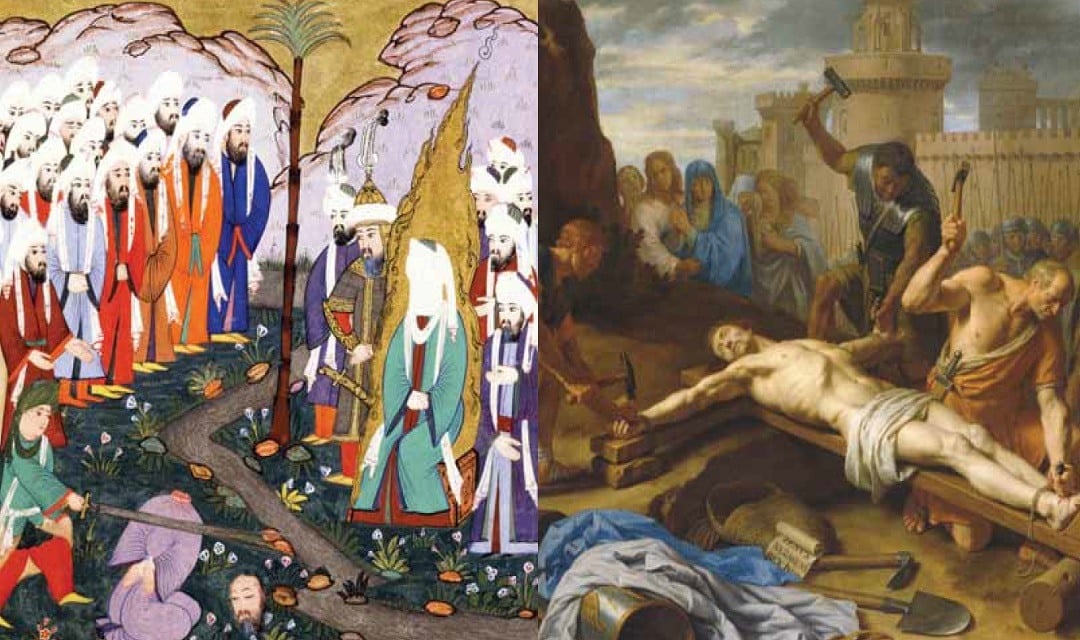This article first appeared in the CHRISTIAN RESEARCH JOURNAL, volume 38, number 06 (2015). The full text of this article in PDF format can be obtained by clicking here. For further information or to subscribe to the CHRISTIAN RESEARCH JOURNAL go to: http://www.equip.org/christian-research-journal/
Although numerous politicians, reporters, and Muslim organizations assure concerned Westerners that the actions of ISIS, Boko Haram, al-Qaeda, al-Shabab, and the Taliban have little or nothing to do with Islam, anyone familiar with Islam’s most trusted sources knows that beheadings, terrorism, and the sexual exploitation of female captives were practiced and promoted by Muhammad and his companions. Hence, challenging the actions of terrorist groups ultimately requires challenging the teachings of Islam.
But there is a difficulty for Christians who oppose violence committed in the name of Allah. The Old Testament contains harsh punishments similar to those found in the Qur’an and the Hadith,1 and the wars of Joshua bear some resemblance to the wars of Muhammad and the “rightly guided” caliphs. How, then, can Christians condemn the attacks carried out by ISIS without thereby condemning our own scriptures? Are we simply being inconsistent?
In this article, we will consider five important differences between sharia (Islamic law) and Old Testament law. Before we discuss the differences, however, we should take note of the similarities that lead to charges of inconsistency.
SIMILARITIES BETWEEN SHARIA AND OLD TESTAMENT LAW
Muslims derive the term sharia from the Qur’an, where Allah declares, “Then We put thee on the (right) way of religion: so follow thou that (way), and follow not the desires of those who know not” (45:18, Ali).2 The Arabic for “way” here is sharia, which in this context refers to the commands Allah delivered to Muhammad. Since the Qur’an (4:65) also orders Muslims to obey Muhammad’s decisions, the body of laws that came to be called “sharia” includes the commands of both Allah and Muhammad.
Mosaic Law is the collection of mitzvot (“commandments,” traditionally numbered by Jewish rabbis at 613) revealed to Moses by God. This system of commands to perform certain acts (mitzvot aseh) and to avoid certain acts (mitzvot lo taaseh) was given to the children of Israel as part of their covenant with the God who delivered them from captivity.
Both sharia and the Law of Moses prescribe harsh penalties for violating moral decrees (e.g., stoning for adultery). Both were delivered by men claiming to have received revelations from God. Both resulted in the formation of theocratic governments charged with enforcing God’s commands.
These similarities shouldn’t be surprising, for Muhammad knew many Jews in Medina and viewed himself as the Arab continuation of the Jewish line of prophets. The Qur’an even affirms the inspiration and authority of the Torah.3 Much more surprising, however, are the differences.
DIFFERENCES BETWEEN SHARIA AND OLD TESTAMENT LAW
The Law of Moses and sharia were delivered in different times, in different lands, in different circumstances, and in different languages. Yet the differences run much deeper than language or location.
Mosaic Law Followed Redemption
In the Old Testament, God gives the Mosaic Law to the children of Israel after delivering them from their bondage in Egypt. God doesn’t go to the Jews during their captivity and tell them that if they faithfully obey His laws, then He will rescue them from the Egyptians. Instead, He rescues them first and then gives them the Law. This foreshadows the gospel: “God demonstrates His own love toward us, in that while we were yet sinners, Christ died for us” (Rom. 5:8).4 Biblical obedience to God is a result of God’s love, not a prerequisite for God’s love.
According to the Qur’an, obedience to Allah’s commands must precede Allah’s love, for Allah has no love for unbelievers or for those characterized by various sorts of sins:
Allah does not love those who exceed the limits. (2:190)
Allah does not love any ungrateful sinner. (2:276)
Allah does not love the unbelievers. (3:32)
Allah does not love the unjust. (3:57)
Allah does not love him who is proud, boastful. (4:36)
[Allah] does not love the extravagant. (7:31)
Allah does not love the treacherous. (8:58)
Allah does not love the mischief-makers. (28:77)
Allah does not love any arrogant boaster. (57:23)
Sharia should therefore be viewed as the “way” or “path” to earning Allah’s love (a concept completely foreign to the Bible5).
Mosaic Law Was Accompanied by Miracles
Claiming to speak for God is no small matter, but the Mosaic Law came with more than mere bold assertions by Moses. God provided miracles before, during, and after His revelation of the Law (e.g., judgments on the Egyptians, the parting of the Red Sea, water pouring from a rock, manna falling from heaven, etc.).
By contrast, the Qur’an repeatedly denies that Muhammad’s revelations were accompanied by any miracle other than the Qur’an itself. After being challenged by Jews and Christians for more than a century on Muhammad’s lack of miracles, Muslims eventually composed a number of miraculous stories and incorporated them into later sources. However, these stories directly contradict the Qur’an:
They say: “Why is not a sign sent down to him [i.e., Muhammad] from his Lord?” Say: “The Unseen is only for Allah (to know), then wait ye: I too will wait with you.” (10:20, Ali)
And the unbelievers say: “Why is not a sign sent down to him from his Lord?” But thou art truly a warner, and to every people a guide. (13:7, Ali)
Yet they say: “Why are not signs sent down to him from his Lord?” Say: “The signs are indeed with Allah: and I am indeed a clear Warner.” And is it not enough for them that we have sent down to thee the Book which is rehearsed to them? Verily, in it is Mercy and a Reminder to those who believe. (29:50–51, Ali)6
The difference here is quite relevant to the issue of harsh legal punishments in the Old Testament and the Qur’an. Disobeying a man who claims to speak for God but who can offer no evidence apart from his Arabic prose is one thing; disobeying the God who guides you through the desert as a pillar of fire is something else entirely. If accountability is proportional to the evidence offered, Jews who rebelled against God’s commands were without excuse.
Mosaic Law Promoted Fairness toward Everyone
One of the most famous Old Testament commands was that Jews love their neighbors as themselves: “You shall not take vengeance, nor bear any grudge against the sons of your people, but you shall love your neighbor as yourself; I am the Lord” (Lev. 19:18).
Far more striking (especially considering the cultures of the time) is God’s command later in the same chapter to apply the same love to non-Jews: “When a stranger resides with you in your land, you shall not do him wrong. The stranger who resides with you shall be to you as the native among you, and you shall love him as yourself, for you were aliens in the land of Egypt; I am the Lord your God” (Lev. 19:33–34).
Approximately two thousand years after Moses delivered these words to the children of Israel, the Qur’an demanded significantly different treatment for believers and unbelievers: “Muhammad is the Messenger of Allah, and those who are with him are severe against disbelievers, and merciful among themselves” (48:29, Hilali-Khan). This “severe” treatment of non-Muslims is based on their inferiority. Allah calls Jews, Christians, and al-Mushrikun (idolaters) “the worst of creatures”: “Verily, those who disbelieve (in the religion of Islam, the Qur’an and Prophet Muhammad) from among the people of the Scripture (Jews and Christians) and Al-Mushrikun will abide in the Fire of Hell. They are the worst of creatures” (98:6, Hilali-Khan). Muslims, however, are the “best of peoples,” for Allah says to Muslims, “You are the best of peoples ever raised up for mankind” (3:110, Hilali-Khan).
Thus, while the God of the Bible reminds Jews that they, too, were once aliens in the land of Egypt and were rescued by grace, Allah reminds Muslims that they are superior to non-Muslims and should treat non-Muslims accordingly.
Mosaic Law Was Geographically Limited
In Exodus 23:31, God says to the Israelites: “I will fix your boundary from the Red Sea to the sea of the Philistines, and from the wilderness to the River Euphrates.” God’s covenant was with Jews who agreed to obey His commands in exchange for a special divine right to the land. Anyone who didn’t want to obey the Mosaic Law was free to leave the land of Israel. Those who remained in the land agreed to be subject to the terms of the covenant (including punishments for violating the Law). The Jews were never commanded to march on the world and enforce Mosaic Law on non-Jewish populations.
Sharia, however, is to be imposed on the entire world. According to the Qur’an, Allah sent Muhammad to make Islam prevail over all other religions: “He it is Who sent His Apostle with guidance and the religion of truth, that He might cause it to prevail over all religions, though the polytheists may be averse” (9:33).
Muhammad would achieve this victory by fighting unbelievers until they submit to Islam: “Allah’s Messenger said, ‘I have been ordered to fight the people till they say: La ilaha illallah [“There is no God but Allah”], and whoever said La ilaha illahllah, Allah will save his property and his life from me.’”7
In a vision, Muhammad was shown that his Ummah (Muslim community) would eventually enforce sharia throughout the world: “The Messenger of Allah said: ‘Allah
drew the ends of the earth together for me to see, and I saw its eastern and western lands, and I saw that the dominion of my Ummah will reach as far as that which was drawn together for me to see.’”8
By their natures, then, Mosaic Law is geographically limited, while sharia is aggressively expansionistic.
Mosaic Law Was Not the Final Message
The Mosaic covenant was for the children of Israel, not for the rest of the world. Indeed, even in the Old Testament, God announces that a new covenant is coming: “’Behold, days are coming,’ declares the Lord, ‘when I will make a new covenant with the house of Israel and with the house of Judah, not like the covenant which I made with their fathers in the day I took them by the hand to bring them out of the land of Egypt, My covenant which they broke, although I was a husband to them,’ declares the Lord” (Jer. 31:31–32).
Through the Messiah, God’s new covenant would reach both Jews and Gentiles. In a prophecy, God says to the Messiah: “I am the Lord, I have called You in righteousness, I will also hold You by the hand and watch over You, and I will appoint You as a covenant to the people, as a light to the nations” (Isa. 42:6).
Old Testament prophecies about a new covenant were fulfilled by Jesus, who sealed the covenant with His own blood: “While they were eating, Jesus took some bread, and after a blessing, He broke it and gave it to the disciples, and said, ‘Take, eat; this is My body.’ And when He had taken a cup and given thanks, He gave it to them, saying, ‘Drink from it, all of you; for this is My blood of the covenant, which is poured out for many for forgiveness of sins’” (Matt. 26:26–28). Thus, the Mosaic covenant was a temporary steppingstone to a new covenant.
Is there a new covenant after sharia? In the Qur’an, Allah declares, “Muhammad is not the father of any of your men, but he is the Apostle of Allah and the last of the prophets” (33:40). Muhammad agrees, saying, “There will be no prophet after me.”9 Allah’s final marching orders for Muslims, it seems, involve beheadings, killing apostates, the oppression of women, and the violent subjugation of the entire world to sharia.
ASSESSMENT
While there are many other differences between Mosaic Law and sharia (we would have to go command by command to explore them all10), we have seen enough to dispel charges of inconsistency. Christians who condemn ISIS-style beheadings, sexual exploitation of women, and oppression of religious minorities are not being hypocrites, for the similarities between the Law of Moses and the Law of Muhammad are superficial. Hence, atheists and Muslims who bring up the Bible when sharia is questioned or criticized would do well to open a Bible and see what it really says.
David Wood, PhD, is host of the Trinity Channel’s live talk show Jesus or Muhammad? He has participated in more than forty moderated public debates in the United States, Great Britain, and France.
NOTES
- Muslims believe the Qur’an to be the direct word of Allah. The Hadith (in numerous volumes and collections) contains the teachings of Muhammad.
- Unless otherwise noted, Qur’an quotations are from the M. H. Shakir translation. Other verses, where noted, are taken from the Abdullah Yusuf Ali translation (Ali) and the Hilali-Khan translation (Hilali-Khan).
- See 3:3–4; 5:43–44; 5:68; 7:157; 10:94.
- All Bible quotations are from the New American Standard Bible.
- In response to Qur’an passages stating that Allah does not love unbelievers, some may note that certain Old Testament passages say that God hates sinners (e.g., Lev. 20:23; Psa. 5:5; 11:5; etc.). However, here again there is a glaring difference between the Qur’an and the Bible. Jesus orders His followers to “love your enemies and pray for those who persecute you, so that you may be sons of your Father who is in heaven” (Matt. 5:44–45; cf. Rom. 5:6–8). Since Jesus’ words are authoritative, statements about God hating sinners will have to be harmonized with statements about God loving sinners, typically either by arguing that passages such as Psalm 5:5 are poetic expressions of God’s hatred of sin or by arguing that God loves sinners in one way but hates them in a different way. The Qur’an, by contrast, requires no such harmonization, for there is simply no emphasis on God’s love for sinners or unbelievers.
- See also 2:118; 6:37; 6:109; 11:12; 13:27; 17:59; 17:90–93; 20:133; 28:48.
- Sahih al-Bukhari, trans. Muhammad Muhsin Khan (Riyadh, Saudi Arabia: Darussalam Publishers, 1997), 6924. Cf. Qur’an 5:32–33; 9:29; 9:111; 9:123; 48:29.
- Sahih Muslim, trans. Nasiruddin al-Khattab (Riyadh, Saudi Arabia: Darussalam Publishers, 2007), 7258.
- Sahih al-Bukhari
- For a careful discussion of Old Testament laws that appear exceedingly harsh by modern standards, see Paul Copan, Is God a Moral Monster? (Grand Rapids: Baker Books, 2011). For an analysis of the claim that Old Testament wars involved genocide, see Paul Copan and Matthew Flannagan, Did God Really Command Genocide? (Grand Rapids: Baker Books, 2014); and Matthew Flannagan, “Is the God of the Old Testament a Proponent of Total War against Noncombatants?” in this issue of the JOURNAL, 10–11.









